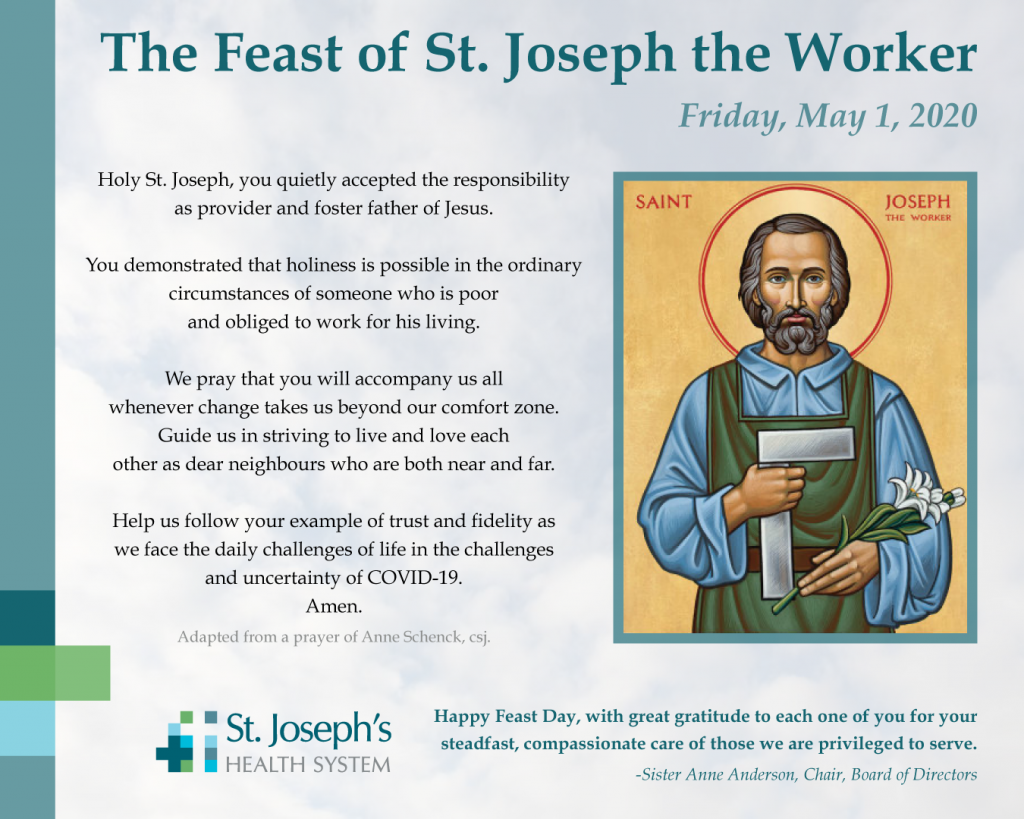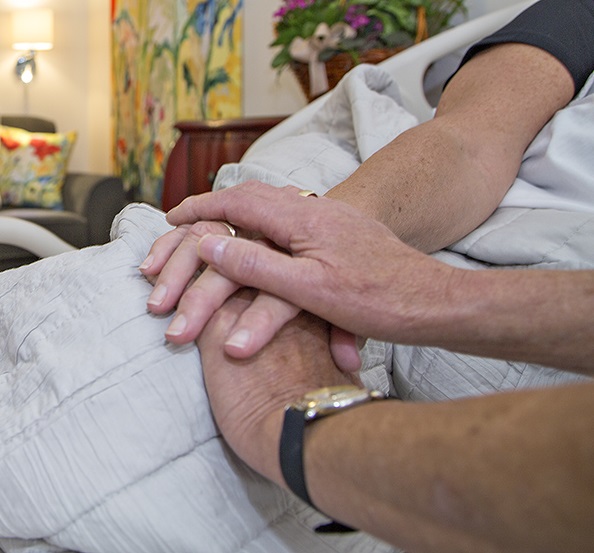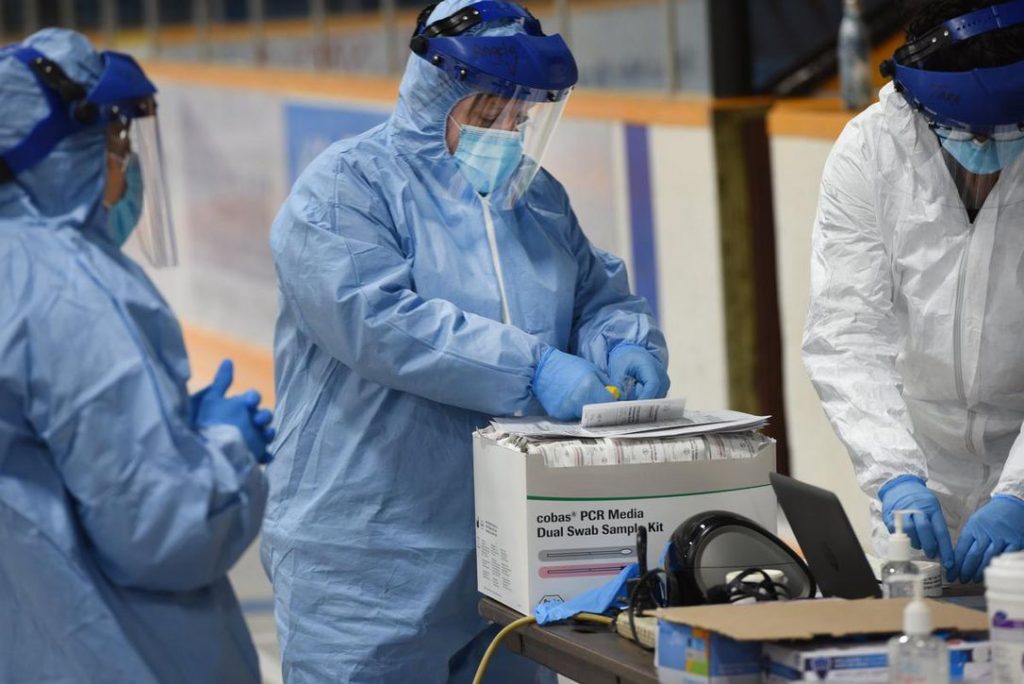Susan Gamble, The Brantford Expositor
Published on: May 4, 2020
The physical distancing requirements aimed at stopping the spread of COVID-19 have meant changes in how people can say goodbye to their loved ones at the Stedman Community Hospice,
“Our rules have changed but our overall objective is still the same – to ensure the best possible hospice experience for the patient, family and their visitors,” said executive director Elaine Calvert.
She said patients and their family members understand the new guidelines before admission.
“Everyone is provided with the information prior to an admission decision so they can understand the rules before they come. We make sure there’s a full awareness.”
The biggest change is that the hospice, with few exceptions, permits only one designated family member to be with a patient during the admission phase and one family member at a time when death is imminent. It’s similar to rules at Brantford General Hospital, where visitors are barred except for specific compassionate grounds to see dying patients.
But the design of the hospice’s Hankinson House, which opened in 2014, makes it accessible for “window visits,” said Calvert. Each of the 10 rooms that house patients has a large low window.
“They’re very popular and we are so fortunate to have a building that can accommodate privacy.”
A large deck soon will accommodate outdoors visits, too.
Hankinson House also is outfitted with technology that allows people to visit using FaceTime and Skype. And staff is on hand to support phone calls and virtual visits.
“We’re seeing every kind of device and all kinds of virtual presence you can imagine,” Calvert said. “Sometimes it even means combining a phone call with a window visit.”
Such visits are planned and co-ordinated with the staff.
“We’ve had to get very creative,” said Calvert.
“These are such unusual times but I could not be more proud of our staff. The level of co-ordination and commitment they demonstrate each day to ensure the patients and their families are supported is amazing.”
All visitors to the hospice are screened and staff wear masks and follow physical distancing guidelines set by the province.
Calvert said the hospice misses its volunteers who helped in the kitchen and with maintaining gardens.
“They are such an important part of the team and we very much look forward to welcoming them back.”
Despite the new rules, no one has turned down admission to Hankinson House, said David Wormald, president of the St. Joseph’s Lifecare Centre, which runs the hospice, along with the adjacent long-term care residence..
There have been no confirmed cases of COVID-19 in residents of either the hospice or at long-term residence.
A COVID-19 outbreak was declared at St. Joseph’s on April 2 after a staff member at the long-term residence tested positive for the virus. That outbreak was declared over on April 12 but a second staff member tested positive April 23. But subsequent extensive testing has yielded no further positive results.
“We took a very proactive approach early on and our staff is absolutely dedicated to our hospice and long-term residents,” said Wormald. “They’re showing such commitment and living our mission of compassion, courage and care.”
He said St. Joseph’s considers it essential to protect its staff, residents and their family members.
“These are quite extraordinary times but we continue to be vigilant.”
Sunday was to be date for the 16th annual Hike for Hospice, which has been postponed due to the virus. The hospice has an annual operating budget of about $3 million, with about half funded by community donations through the St. Joseph’s Lifecare Foundation. Last year’s hike brought in just over $338,000.
The hike was also meant to mark the official retirement of Olga Consorti from the president and CEO role she has held with the foundation for the past 30 years. She has agreed to stay in the role until at least the end of June.
SGamble@postmedia.com
@EXPSGamble
Services available to cleaners, administrators as well as nurses and doctors
Dan Taekema · CBC News · May 06, 2020

Randi McCabe is a clinical psychologist at St. Joseph’s Healthcare Hamilton who helped design mental health services for health and community-care workers.
St. Joseph’s Healthcare Hamilton has a message for anyone working on the front line of the COVID-19 pandemic: “You don’t have to suffer alone.”
The hospital system is stepping up as the regional lead for mental health support, covering the city and everything west of it and offering those dealing directly with the pandemic — in any setting or role —someone to talk to.
“We’re really talking about anybody who’s on that front line. It could be housekeeping staff … nutrition staff, admin staff checking people in at the door,” said Randi McCabe, a clinical psychologist at St. Joe’s. “It could be people working in shelters or hospice.”
McCabe’s family knows how stressful and scary the virus can be. Her husband works on a COVID-19 unit and whenever he comes home he makes sure to wash his clothes and shower before speaking with his loved ones, she said.
The possibility of passing along the virus is a source of anxiety others who have continued to work through the pandemic also share.
“There’s a big fear of contaminating their family,” explained McCabe. “The stress of ‘Well how do I keep myself separate from my family? Am I cleaning myself enough?'”
Concerns about people’s own health and safety as well as exhaustion from working in a setting, such as a long-term care home, that doesn’t have enough staff also create a “huge burden of stress,” she said.
Then there’s the weight of trying to treat someone with the virus only to watch them die.
“It’s very painful emotionally to be involved when someone actually passes away from COVID,” said McCabe. “It’s very sad.”
The province announced Tuesday it was expanding virtual mental health services.
“In order to help stop the spread of this deadly virus our frontline workers are working long hours in stressful situations and people across the province are doing their part by staying home, in many cases alone,” stated Health Minister Christine Elliott in a media release.
“We know these actions are not easy and can cause stress, anxiety and other mental health issues. That’s why we are providing virtual mental health supports, allowing people to get the help they need while still physically distancing.”
St. Joe’s has partnered with the Canadian Mental Health Association to determine what support is best for each individual who calls in or fills out an online intake form.
Services include self-help, counselling by phone or online, peer-to-peer support and in-person visits for those in crisis.
Anyone who’s finding their sleep, appetite or relationships with loved ones affected by the stress of their role is encouraged to reach out.
The pandemic has introduced a “new abnormal,” said McCabe, and chances are it will last until a vaccine can be found. That means the stress will be sticking around too.
“This isn’t going anywhere and it’s actually going to change how we do things for quite a ways to come,” she added.
“There is help and hopefully some relief for people if they’re suffering from the effects of their stressful positions right now.”
Today, May 1, 2020, we celebrate the Feast of St. Joseph the Worker.
On this day, at the start of Mass in the Casa Santa Marta, Pope Francis prayed: “Today, on the feast of St. Joseph the Worker and the day dedicated to workers, let us pray for all workers, so that no one might be without work and all might be paid a just wage. May they benefit from the dignity of work and the beauty of rest.”
Today, we follow the footsteps of St. Joseph and pray for all workers.

By Katrina Clarke Spectator Reporter
Mon., April 20, 2020
A new pilot project will see some 3,000 asymptomatic residents and staff at Hamilton and area care settings tested for COVID-19.
On Monday, St. Joseph’s Health System and Niagara Health announced a pilot project is underway to test all asymptomatic patients, residents and some staff in its long-term care homes, retirement homes and congregate settings, such as hospices.
The goal is to gain a better understanding of how the virus spreads, how can spread be prevented and what testing strategies are most effective when the subjects are concentrated in one place, said Dr. Jack Gauldie, vice-president of research at St. Joseph’s Healthcare Hamilton.
“Right now, we stand outside long-term care homes and we don’t know how many people are carriers in there, how many people are affected,” Gauldie said. “The earlier you catch something, the earlier you can do something about it.”
The announcement comes a week after the province said more people in long-term care settings would be tested for the virus. Testing of all asymptomatic staff and residents at “select homes” would take place, said Minister of Long-Term Care Merrilee Fullerton.
Dr. Tom Stewart, CEO of St. Joseph’s Health System, said those involved with the pilot project wanted to be ahead of the curve.
“Let’s get an understanding of are there patients in there that are asymptomatic that could be the cause of a future outbreak?” Stewart said. “Let’s collect more information.”
Testing is already underway.
According to a release, 111 long-term care residents have so far been tested for COVID-19 “whether they had symptoms or not” as part of the pilot. All tests were negative. Staff have the option of being tested.
All 3,000 tests are expected to be carried out this week, Stewart said.
Facilities included in the pilot project include St. Joseph’s Villa in Dundas, St. Joseph’s Health Centre in Guelph, St. Joseph’s Lifecare Centre Brantford and Stedman Community Hospice in Brantford, St. Joseph’s Home Care First Place retirement living in Hamilton and the Niagara Health long-term care unit in Welland.
Hamilton public health, meanwhile, has carried out “mass testing” of staff and residents at seniors’ care homes, said Dr. Bart Harvey, Hamilton’s associate medical officer of health, on Monday.
Mass testing sites include Cardinal Retirement Residence, Chartwell Deerview Crossing Retirement Residence and Kingsberry Retirement Residence. Outbreaks are ongoing at each location.
So far, 45 residents and 17 staff at Cardinal have tested positive. Six died. One staff member at Chartwell Deerview tested positive and three Kingsberry residents have tested positive.
Harvey said mass testing gives public health “a much better idea of what efforts are needed and what strategies are needed to curb any further transmission.”
Long-term care homes across the country have been the epicentre of deadly COVID-19 outbreaks for more than a month. Half of Canada’s COVID-19 deaths stem from long-term care homes, said Dr. Theresa Tam, the country’s chief public health officer, last week.
As of Monday, 16 people in Hamilton have died from COVID. All but four were residents of one of two long-term care homes — Heritage Green and Cardinal — or Emmanuel House Hospice.
The pilot project is a joint effort and includes researchers at the Research Institute of St. Joe’s Hamilton, McMaster University, Hamilton Regional Laboratory Medicine Program, Guelph Family Health Team and GTA public health units.
Gauldie said once the project is complete, experts will analyze data, looking at how to minimize glitches, maximize efficiency and improve accuracy.
“We need to see how to do it correctly,” he said.
Katrina Clarke is a Hamilton-based reporter at The Spectator. Reach her via email: katrinaclarke@thespec.com
St. Joseph’s Health System & Niagara Health launch new pilot surveillance project to protect the most vulnerable in our health system
April 20, 2020 – COVID-19 has had a devasting effect within many congregate care facilities caring for vulnerable elderly residents, prompting the Ontario government to call for greater testing in long-term care and retirement homes.
With that in mind, St. Joseph’s Health System (SJHS) and Niagara Health are taking the vital step in testing all asymptomatic patients, residents and select staff within its long-term care, retirement home and congregate settings as part of a pilot surveillance project.
Under the directive of Dr. Tom Stewart, CEO of St. Joseph’s Health System and Niagara Health, and the SJHS Executive team, supported by Research Institute and Lab, the project will test our most vulnerable patients and residents, including those living in long-term care, to save lives.
Researchers at the Research Institute of St. Joe’s Hamilton, McMaster University, Guelph Assessment Centre, Public Health Ontario Lab and select public health units across the GTA are working together to test thousands of samples collected from long-term care facilities and retirement homes.
“We are testing the prevalence of asymptomatic COVID positive cases that could inform future testing strategies and prevention measures to curb the spread of this devastating virus and save lives,” Says Dr. Jack Gauldie, Vice-President of Research at St. Joseph’s Healthcare Hamilton. “It’s vital we learn how we can protect our most vulnerable population and our staff today and, in the future. We need to share our findings widely to make changes to how we protect the elderly living in congregate settings.”
“St. Joseph’s Health System and Niagara Health are committed to delivering integrated care across the continuum,” says Dr. Tom Stewart. “With our capacity and network of hospitals, research laboratories, long-term care home, Home Care, and retirement homes, it would be irresponsible not to put our collective efforts together in the fight against COVID-19. If our surveillance project demonstrates that asymptomatic cases can be COVID positive, it will dramatically change the COVID-19 response and prevention strategy going forward and most importantly will save lives.”
Testing of staff, residents and patients across St. Joseph’s Health System and Niagara Health has already begun.
“We have tested all 111 long-term care residents for COVID-19 whether they had symptoms or not. All results have come back negative,” Says Lynn Guerriero, President of Niagara Health. “We need to do everything we can to minimize the risk to our residents, and testing will continue on a regular basis to support a safe environment and understand more about this virus.”
The Office of the Chief Medical Officer of Health, working with the Ministry of Long-Term Care and Ontario Health, will review results from these tests and work to refine testing guidance as appropriate to support continued testing of asymptomatic residents and staff.
Partnering Organizations
- Research at St. Joes
- St. Joseph’s Villa Dundas
- St. Joseph’s Health Centre Guelph
- St. Joseph’s Lifecare Centre Brantford & Stedman Community Hospice
- St. Joseph’s Home Care
- Niagara Health
- Hamilton Regional Laboratory Medicine Program
- McMaster University
- Wellington-Dufferin-Guelph Public Health
- Guelph Assessment Centre
- Hamilton Public Health
- Brant County Health Unit
- Niagara Regional Public Health
- PHO Lab
- Ontario Public Health
- Ministry of Health & Ministry of Long-Term Care
A beautiful prayer and message of hope from Sister Anne Anderson, Chair, Board of Directors, St. Joseph’s Health System, during this difficult time.



